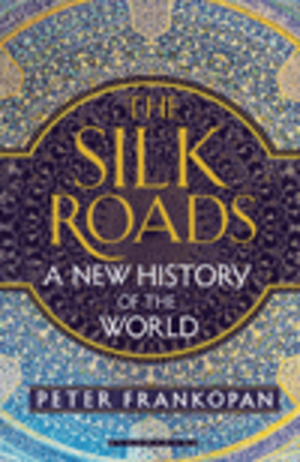The world that trade built
Book review: The Silk Roads: A New History of the WorldAt a time when the Chinese are building a new Silk Road to the Mediterranean, Peter Frankopan's "The Silk Roads" is essential reading, says John Stepek.

Get the latest financial news, insights and expert analysis from our award-winning MoneyWeek team, to help you understand what really matters when it comes to your finances.
You are now subscribed
Your newsletter sign-up was successful
Want to add more newsletters?

Twice daily
MoneyWeek
Get the latest financial news, insights and expert analysis from our award-winning MoneyWeek team, to help you understand what really matters when it comes to your finances.

Four times a week
Look After My Bills
Sign up to our free money-saving newsletter, filled with the latest news and expert advice to help you find the best tips and deals for managing your bills. Start saving today!

The Silk Roads: A New History of the World
by Peter FrankopanPublished by Bloomsbury, £30(Buy on Amazon)
I'm not a historian.I studied the subject to GCSE level, and like most people, I'm interested in certain bits more than others, but my grasp of the "big sweeping picture" of history is fairly traditional: Big Bang, dinosaurs, cavemen, Greeks, Romans, the Dark Ages, Vikings, Robert the Bruce (I went to school in Scotland), the Tudors, World War I, World War II and now.
MoneyWeek
Subscribe to MoneyWeek today and get your first six magazine issues absolutely FREE

Sign up to Money Morning
Don't miss the latest investment and personal finances news, market analysis, plus money-saving tips with our free twice-daily newsletter
Don't miss the latest investment and personal finances news, market analysis, plus money-saving tips with our free twice-daily newsletter
So I was looking forward to plugging some gaps with The Silk Roads: A New History of the World. As the subtitle suggests, the author, Peter Frankopan, a director of the Centre for Byzantine Research at Oxford and sometime MoneyWeek contributor, has written a popular history of the world from an Asia-centric, or globalised, perspective, as opposed to the more Europe-focused version many of us are more used to.
The book follows a rough timeline from the founding of the Persian empire in the sixth century BC, until the present day. The narrative focuses on the trade networks (the titular Silk Roads) of Asia and the Middle East. This enables Frankopan to split a book of ambitious scope into manageable chunks: a chapter on the crusades is titled "The Road to Heaven", while another on Hitler's efforts to secure wartime access to Ukraine's fertile soil is "The Wheat Road".
It also highlights the book's focus on economics, trade, currency and control of resources as a major force in shaping history for example, he notes that the speed of Islam's rise was partly influenced by a major depression in the region, caused by the Perso-Roman wars disrupting trade.
As befits a book that spans well over two millennia, almost every page (particularly in the early chapters) presents a barrage of exotic names, any one of which could trigger an evening's worth of diverting Googling. But Frankopan handles the material deftly and has an eye for telling details there are plenty of anecdotes you'll stash away for future use, from the use of bolts of raw silk as currency, to an 11th-century self-help manual complete with advice to the era's nouveau riche on how to host a decent dinner party.
A clear theme is that globalisation is not a new phenomenon, but one that waxes and wanes, and Frankopan's central thesis is that power is shifting eastwards again. It's hard to disagree, though I'd be interested in his take on the shale revolution and US energy independence, which clearly has major implicationsfor one of the key levers of powerwielded by the region. But at a time when the Chinese, under their "One Belt, One Road" policy, are building a new Silk Road to the Mediterranean, this is essential reading.
The Silk Roads: A New History of the World by Peter Frankopan. Published by Bloomsbury, £30.
Get the latest financial news, insights and expert analysis from our award-winning MoneyWeek team, to help you understand what really matters when it comes to your finances.

-
 ISA fund and trust picks for every type of investor – which could work for you?
ISA fund and trust picks for every type of investor – which could work for you?Whether you’re an ISA investor seeking reliable returns, looking to add a bit more risk to your portfolio or are new to investing, MoneyWeek asked the experts for funds and investment trusts you could consider in 2026
-
 The most popular fund sectors of 2025 as investor outflows continue
The most popular fund sectors of 2025 as investor outflows continueIt was another difficult year for fund inflows but there are signs that investors are returning to the financial markets